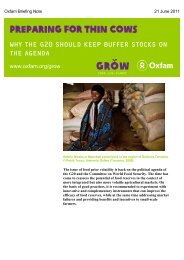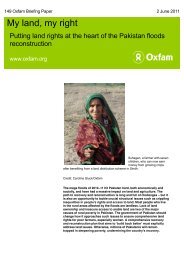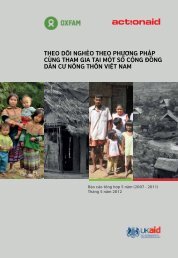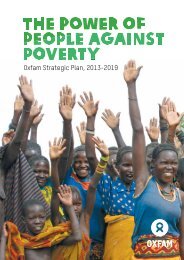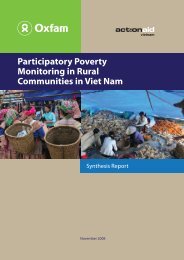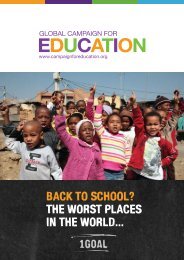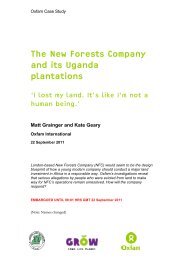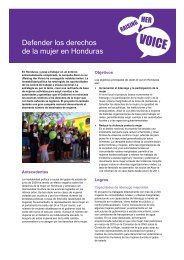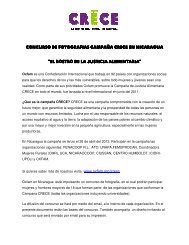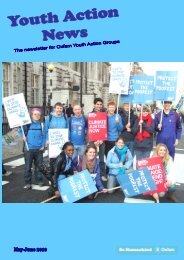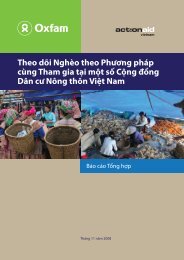Challenges to Rural Poverty Reduction in Viet Nam - Oxfam Blogs
Challenges to Rural Poverty Reduction in Viet Nam - Oxfam Blogs
Challenges to Rural Poverty Reduction in Viet Nam - Oxfam Blogs
Create successful ePaper yourself
Turn your PDF publications into a flip-book with our unique Google optimized e-Paper software.
Participa<strong>to</strong>ry poverty moni<strong>to</strong>r<strong>in</strong>g <strong>in</strong> rural communities <strong>in</strong> <strong>Viet</strong> <strong>Nam</strong><br />
82<br />
or drug users. Assistance should concentrate on mitigat<strong>in</strong>g specific risks and<br />
support<strong>in</strong>g susta<strong>in</strong>able livelihoods.<br />
• The near-poor <strong>in</strong>clude also the households who have just escaped from<br />
poverty, and their liv<strong>in</strong>g standards are not much higher than those actually <strong>in</strong><br />
poverty. The near-poor also tend <strong>to</strong> lack sav<strong>in</strong>gs. As a group they require a<br />
system of support policies similar <strong>to</strong> the temporarily poor <strong>in</strong> a certa<strong>in</strong> period (2-3<br />
years) for susta<strong>in</strong>able poverty reduction.<br />
<strong>Poverty</strong> reviews conducted at the end of the year excludes households who<br />
fall <strong>in</strong><strong>to</strong> poverty at other times of the year. Near-poor and vulnerable households<br />
can easily fall <strong>in</strong><strong>to</strong> poverty at any time of the year. In pr<strong>in</strong>ciple, the list of poor households<br />
can be updated dur<strong>in</strong>g the year, but because of complicated procedures and paper<br />
work, this is not done at all moni<strong>to</strong>r<strong>in</strong>g po<strong>in</strong>ts. The current policy on support for people<br />
who face unanticipated difficulties is also weak <strong>in</strong> terms of its coverage and fund<strong>in</strong>g.<br />
Other limitations <strong>in</strong> target<strong>in</strong>g groups<br />
The target-oriented mechanism is <strong>to</strong>o complicated, creat<strong>in</strong>g a management<br />
burden. The group of cadres <strong>in</strong> Vi Xuyen district-Ha Giang commented “Mechanisms<br />
and policies should be synchronised. There are <strong>to</strong>o many policy documents, for example<br />
those relat<strong>in</strong>g <strong>to</strong> tuition fee exemptions and reductions for poor students <strong>in</strong> Category III<br />
communes under Decree 49. The files of beneficiaries are <strong>to</strong>o thick”.<br />
“Cash transfer (conditional or unconditional)” programmes based on targets<br />
are not available. In <strong>Viet</strong> <strong>Nam</strong>, there is direct cash support for education expenses for<br />
poor students, orphans and students liv<strong>in</strong>g <strong>in</strong> border, highland, and island areas and <strong>in</strong><br />
specially disadvantaged communes under Decree 49. However, the level of support<br />
under Decree 49 is <strong>to</strong>o low, and has limited impact. Other possible recipients<br />
<strong>in</strong>clude the mother and child healthcare which currently has no cash support policy.<br />
Although conditional cash transfers have proved successful <strong>in</strong> other countries they can<br />
be difficult <strong>to</strong> manage and moni<strong>to</strong>r.<br />
3.2. Social assistance<br />
In general, social assistance has been duly provided <strong>to</strong> the right beneficiaries<br />
already listed at the moni<strong>to</strong>r<strong>in</strong>g po<strong>in</strong>ts. Households <strong>in</strong> difficult circumstances reported <strong>in</strong><br />
<strong>in</strong>terview that they were happy <strong>to</strong> receive regular assistance under Decree 67, help<strong>in</strong>g<br />
them <strong>to</strong> partially cover their daily expenses. In addition, the Government has also<br />
provided ad hoc support <strong>to</strong> people and households who have suffered natural disasters<br />
or food shortages.<br />
The level and coverage of social assistance policies has been <strong>in</strong>creased. Decree<br />
13 (effective 13 April 2010, and which revises and supplements Decree 67) has:<br />
• Increased the basic level of assistance from 120,000 VND per month <strong>to</strong><br />
180,000 VND per month<br />
• Removed the requirement that disabled people who are no longer able <strong>to</strong> work<br />
or look after themselves must be a “a member of a poor household”<br />
• Lowered certa<strong>in</strong> requirements for people with mental health problems<br />
• Provided tuition and education materials <strong>to</strong> social assistance recipients who<br />
are attend<strong>in</strong>g school.<br />
Accord<strong>in</strong>g <strong>to</strong> the Law on the Elderly, start<strong>in</strong>g <strong>in</strong> early 2011, people over the age of<br />
80 (previously 85) are entitled <strong>to</strong> social assistance. This is a step forward <strong>in</strong> social<br />
assistance policy. However, the level of basic assistance of 180,000 VND/month<br />
is <strong>to</strong>o low compared <strong>to</strong> the cost of liv<strong>in</strong>g at present.



